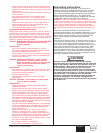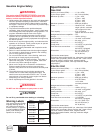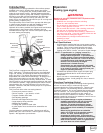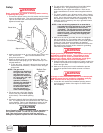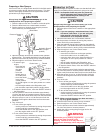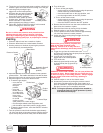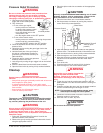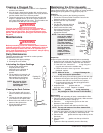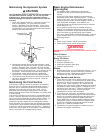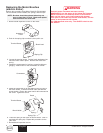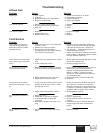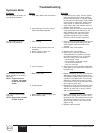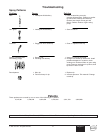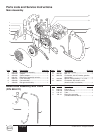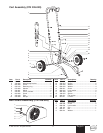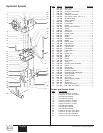Special offers from our partners!

Find Replacement BBQ Parts for 20,308 Models. Repair your BBQ today.

Maintaining the Hydraulic System
Use of Speeflo's Coolflo™ Hydraulic Fluid is mandatory in
the PowrTwin hydraulic system. Do not use any other
hydraulic fluid. Use of any other hydraulic fluid may
seriously damage the hydraulic system and will void the
warranty.
1. Check the hydraulic fluid daily. It should be at the “Full”
mark on the dipstick. If it is low, add only Speeflo
Coolflo™ Hydraulic Fluid (P/N 430-361). Never add or
change hydraulic fluid except in a clean, dust-free area.
Contamination of the hydraulic fluid will shorten hydraulic
pump life and may void warranty.
2. Change the hydraulic fluid every twelve months. Drain
the old fluid from the tank and fill with 5 quarts of Speeflo
Coolflo™ Hydraulic Fluid. Start the unit at just enough
pressure to operate the fluid section. Run the unit at this
low pressure for at least 5 minutes. This removes air from
the system. Check the fluid level after this procedure.
3. The hydraulic system has an external, replaceable
hydraulic filter. Change the filter every twelve months.
4. The hydraulic pump should not be serviced in the field. If
service on the hydraulic pump is required, it must be
returned to Speeflo.
Maintaining the Fluid Section
If the sprayer is going to be out of service for an extended
period of time, it is recommended that following cleanup, a
kerosene and oil mixture be introduced as a preservative.
Packings may tend to dry out from lack of use. This is
particularly true of the upper packing set for which upper
packing lubricant Piston Lube (P/N 700-925) is recommended
in normal usage.
If the sprayer has been out of service for an extended period
of time, it may be necessary to prime the suction by pouring
some of the paint solvent into the siphon tube to restart. It is
extremely important that the threads on the siphon hose
coupling are properly sealed. Any air leakage will produce
erratic operation of the sprayer and may damage the system.
The up and the down strokes should be approximately equal
in time (one should not be faster than the other). A fast up or
down stroke may indicate air in the system or malfunctioning
valve or seats (see the Troubleshooting section).
"Full" Mark
Hydraulic Fluid
Cap/Dipstick
Hydraulic
Filter
CAUTION
Basic Engine Maintenance
(gas engine)
• For detailed engine maintenance and technical
specifications refer to the separate gasoline engine
manual.
• All service to the engine should be performed by an
authorized Honda Power Equipment dealer. To locate a
dealer in your area, look in the Yellow Pages of your
telephone directory under Gasoline Engines, Garden &
Lawn Equipment & Supplies, Lawn Mowers, etc.
• The Honda engine is warranted exclusively by American
Honda Motor Co., Inc.
• Use a premium quality motor oil certified to meet or
exceed U.S. Automotive requirement SG.or SF. SAE
10W30 is recommended for general all temperature use.
Other viscosities may be required in other climates.
• Use only a (NGK) BP6ES or BPR6E spark plug. Gap the
plug to 0.028 to 0.031 In. (0.7 to 0.8 mm) Always use a
spark plug wrench.
Daily
1. Check engine oil level, and fill as necessary.
2. Check gasoline level, and fill as necessary.
Always follow the fueling procedure outlined earlier in this
manual.
First 20 Hours
1. Change engine oil.
Every 100 Hours
1. Change engine oil.
2. Clean the sediment cup.
3. Clean and re-gap the spark plug.
4. Clean the spark arrestor.
Weekly
1. Remove the air filter cover and clean the element. In very
dusty environments, check the filter daily. Replace the
element as needed. Replacement elements can be
purchased from your local Honda dealer.
Engine Operation and Service
1. Clean and oil air filter pad on gasoline engine every 25
hours or once weekly. Do not permit the air intake screen
around the fly wheel of the gas engine to load up with
paint or trash. Clean it regularly. The service life and
efficiency of the gas engine model depends upon keeping
the gasoline engine running properly. Change the oil in
the engine every 100 hours. Failure to observe this may
result in engine overheating. Consult the engine
manufacturer's service manual provided.
2. To conserve fuel, service life, and efficiency of the unit,
always operate the gasoline engine at the lowest RPM at
which it runs smoothly without laboring and delivers the
amount required for the particular painting operation.
Higher RPM does not produce higher working pressure.
The gasoline engine is connected to the hydraulic pump
by a pulley combination designed to produce full paint
delivery of 1.2 GPM at maximum RPM.
3. The warranty on gasoline engines or electric motors is
limited to the original manufacturer.
WARNING
©Titan Tool Inc. All rights reserved. 11
English



